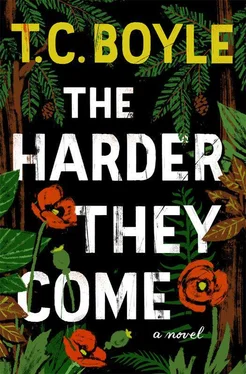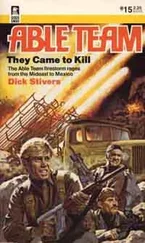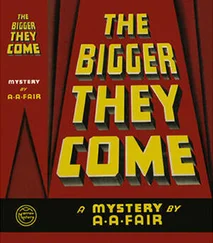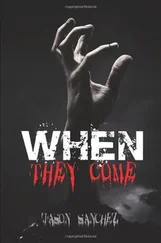He cracked the tab and wet his lips. Cola Lite. It tasted awful, like the amalgam the dentist put in his teeth. No matter. It was wet. He took a swallow and started back around the fat woman’s stall, the shade of the trees giving way to a blast of naked sun so that the headache came up on him all over again and he couldn’t help wishing, for at least the tenth time since they’d left the boat, that he’d remembered his baseball cap.
That was when things changed, changed radically. He was standing there blinking in the light and feeling in his shirt pocket for his sunglasses when a noise — the slamming of a car door — made him look up. There was another car in the lot now, an old American car — what was it, a Chevy? — and it was pulled up right beside the bus. The car was a faded yellow, the finish worn through to rusted metal in so many places it might have been spotted, like one of the big cats that were purportedly roaming the jungle behind them. He saw three men, Ticos, their heads shaved like the driver’s, two with goatees, one without, and they seemed to be dancing, flailing their arms and jumping from one foot to the other as if the ground had caught fire.
“ Todo! ” one was shouting, the one without the goatee. “Empty sus bolsillos, wallet, cellphone, todo !” There was a flash of light, two flashes: the goatees had knives. And the one without, the one doing all the shouting, he had a handgun.
The one with the gun saw him then and pointed it at him, though he was a hundred feet away. “You,” the man shouted, his voice so shrill with the rush of adrenaline it was almost a shriek, almost girlish. “You come over here!”
Sten could feel his heart going, accelerating like a flight of ducks beating up off the surface of a pond, flap, flap, flap . It was an old feeling, a feeling that took him back to another time and place, a seething green overgrown rot-stinking place like this one all the way across the ocean on the far side of the world. There were tropical fish there too. Monkeys. Men with guns. He dropped the can and raised his hands in the air. “Don’t shoot.”
The man with the gun was careless— man, he was a boy, all three of them were boys, nineteen, twenty years old, their limbs like broomsticks poking out of their baggy shorts and oversized T-shirts and their faces ablaze with excitement and maybe something else, maybe drugs. The weapon was just an object to him, Sten could see that in an instant, like a plate of food he was carrying from one table to another. A shoe. A book. A used CD he’d found in a bin at the record shop. He didn’t respect it. He didn’t know it. He didn’t even know how to take a stance and aim. “You,” the man repeated. “Right here, ahora !”
Sten shuffled forward, his feet gone heavy suddenly, so heavy he could barely lift them. He saw Carolee there with the others, her face rinsed with fear, the brim of her hat askew. Everybody was tightly bunched, purses, cameras and backpacks dropping at their feet while the goatees prodded them with their knives. There was a blanket there, he saw that now, spread out in the sun-blasted mud to receive the loot. It was one of those Indian blankets they sold in the tourist shops up and down the coast, the colors garish in the harsh hot light.
When he was there, when he’d reached the one with the gun and allowed himself to be shepherded into the group with a quick hot punch of the barrel in his ribs, he was startled by the faces around him. These were the faces of dead people, drained of animation, their eyes fixed on the ground as they gave up what they had, dropping change, wallets, bracelets and wristwatches into the pile as if they were tossing coins in a fountain. Sheila was murmuring “Oh god, oh god,” over and over. Another woman was crying. The man with the gun prodded him again and said, “Empty it, todo lo que tiene — ahora mismo! ”
He exchanged a look with Carolee, then pulled his pockets inside out and dropped the contents on the pile, card key, dummy wallet, a pack of matches, his cell. He was thinking there was no sense in getting shot over nothing, no sense in getting excited, but then the one with the gun nudged him again and he went cold all over. They were amateurs, children playing at cops and robbers, infants, punks, too stupid even to be scared. Why would they be? This was easy pickings, old people, seniors so frightened and hopeless they could barely twist the watches off their wrists, let alone defend themselves. “ Todo! ” the man repeated.
Everything came into focus suddenly, the two goatees with their hands in people’s pockets and down the front of their shorts, Sheila whimpering Please, no, not my passport, the driver shut inside the bus and the fat woman vanished altogether — in on it, both of them, he was sure of it — and the carelessness, the unforgiveable carelessness of the one with the gun who barely came up to his shoulder for Christ’s sake, who’d turned away from him, turned his back on him as if he were nothing, less than nothing, just old and weak and useless. What he’d learned as a nineteen-year-old himself, a recruit, green as an apple, wasn’t about self-defense, it was about killing, and does anybody ever forget that? Mount a bicycle, lace up a pair of skates, shoot the rapids: here it was. In the next instant he hit the man so hard from behind he felt the shock of it surge through his own body even as he locked his right forearm across the man’s throat and brought his left hand up to tighten the vise, simplest maneuver in the book, first thing they teach you, Choke off the air and don’t let up no matter what .
The gun dropped away at the moment of impact and it wasn’t as if he was merely applying pressure to the man flailing in his arms — he wasn’t doing that, no, he was immobilizing him, because that was what he’d been trained to do and he had no choice in the matter. It was beyond reason now, autonomous, dial it up, semper fi. Everyone froze. The two with the knives looked as if they’d been transported to another planet, helpless, stupefied, scared. And then Bill, his bald crown raking at the light, bent to pick up the gun as if it were some pedestrian thing somebody had dropped in the street, an umbrella, a checkbook, a pair of glasses, his face gratified and composed, almost as if he meant to hand it back to the man kicking in Sten’s arms. Somebody screamed. The man kicked. Sten held tight, tighter, even as he watched the other two drop their knives in the mud and scramble for the car.
The engine sucked fuel, the wheels spun in the mud and then the car was fishtailing across the lot, spewing exhaust and fighting for purchase. Sten watched it go — they all watched — as it threw up clods of earth and sheared through the puddles till it plunged into the tunnel of the road where the deep holes gathered and the stream sank into its pools and the brick-red platys darted and hovered. Then it was quiet. The man in his arms had gone limp, like an exhausted dance partner, and the only thing Sten could think to do was move back a step and lower him to the ground.
Sheila started up again, invoking God, and then Carolee was in his arms and they were all gathered round, staring down at the man in the mud. He was on his back, where Sten had dropped him, eyes open and staring at nothing. He looked shrunken, shorter even than the five-eight or — nine he must have been, no girth to him at all, his oversized shorts and new spotless white T-shirt hanging off him like flour sacks. And his ankles — you could have wrapped two fingers around his ankles.
“Is he—?” somebody said, and now somebody else, a boxy officious-looking man with a pencil mustache Sten could have sworn he’d never seen before in his life, was bending over the body checking for vital signs, ear to chest, finger to wrist. This man — certainly he’d been on the bus — looked up and announced, “I’m a paramedic,” and began alternately kneading the supine man’s chest and blowing into his mouth.
Читать дальше












